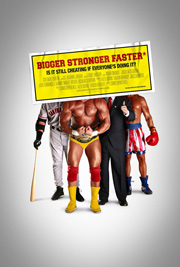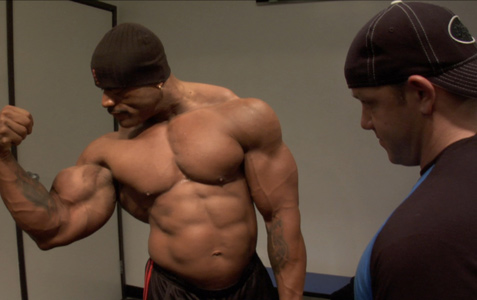Missing Reels: “Bigger Stronger Faster*” (2008)
Missing Reels examines overlooked, unappreciated or unfairly maligned movies. Sometimes these films haven’t been seen by anyone, and sometimes they’ve been seen by everyone… who loathed them. Sometimes they’ve simply been forgotten. But in any case, Missing Reels argues that they deserve to be seen and admired by more people.

It will come as a shock to no one that I’m not much of an athlete or sports nut. Sidelined by asthma and an almost comical lack of coordination, I’ve always been an indoor kid who preferred his comic books and movies to getting out in the field and playing a game. And yet, even with that propensity for introversion and solitary activities, there’s one sport that I do follow: football. The season has just begun and already injuries are piling up, with the shadow of chronic traumatic encephalopathy (CTE) looming over the proceedings. Much like football is a battle of strategy and toughness, so too is the dichotomy for passionately loving the sport with the all too real thought that we’re watching men destroy their bodies and lives for our pleasure.
We ask a lot of our athletes, putting their health at risk on the field while maintaining some semblance of “role model” actions off it. But why? And for what? In the end, it’s a moral struggle about expectations, bloodthirsty crowds and entertainment that leaves us all with some serious questions. These questions don’t just extend to the (very real) possibility of CTE but also of performance enhancing drugs (PEDs). If we want our professional sports players to be at their best, then why do we chastise them for taking something that helps them reach that goal we (unfairly) demand?
The ultimate question that sticks with a viewer after seeing “Bigger Stronger Faster*” is one posed by a medical doctor who has been doing research into PEDs for decades: “If you had to take a drug, with all of the known and unknown risks of anabolic steroids, to keep your job and provide for your family – would you do it?” It’s a haunting piece of rhetoric that hits home in this excellent documentary that looks at the hypocrisy at the heart of the steroid hysteria. While director (and erstwhile star) Christopher Bell does an excellent job of presenting both sides of the debate around steroids, and whether or not he should take them for his own weightlifting goals, he mostly focuses on the fact that steroids aren’t the problem but instead a side effect of the real problem. Americans are addicted to winning; they adore winners and love propping up new idols but are just as ready to tear them down for seemingly arbitrary reasons should they transgress in any manner. This isn’t something just happening in the sports world, as Bell is quick to point out, but instead endemic to the American dream itself as represented by its poster boy, Arnold Schwarzenegger, whose iconography engulfs much of the film.
A piece of agitprop documentary filmmaking that owes a lot to the work of Michael Moore – starting with a personal story to tell a larger one, pointing out American hypocrisy, using media clips to entertain and further the narrative – Bell’s movie is a great piece of undiscovered film because it is so painfully human, which is to say it is multifaceted and connects on an emotional level. Bell is the middle child of three, with both his older and younger brother intermittently using steroids for their wrestling and power lifting goals, respectively. He comes from an unassuming home in Poughkeepsie, NY, to two loving and sincere parents who seemed to always provide for their boys.
At the start of the film, Bell now lives in Venice Beach, CA and has reached a plateau with his weightlifting goals. Should he take steroids to get to the next level, or is that cheating, as so many of us believe? Bell then begins a journey speaking to his brothers about their experiences and looking at the history of PEDs in sports and the fact that his childhood idol, Arnold Schwarzenegger, admits to using steroids but now says there is no room for it in competition. If Schwarzenegger had never used steroids and not won his various titles, would he have still found a way to succeed? Without the steroids, would he have found another path to becoming an athlete, an actor and eventually a governor?
While the documentary seemingly falls more on the side of “there probably shouldn’t be as much brouhaha over steroids,” it arrives at that opinon through careful consideration of medical facts and discussion, and not just gut checks. And while then-enator Joe Biden’s speech before the congressional hearing on the baseball doping scandal hit home, about the fact that people succeeding because they took a shortcut is simply wrong, he is clearly not correct about it being “unAmerican.”

People take shortcuts all the time in this country, and people use chemicals to survive in all sorts of walks of life. I’m currently writing this piece riding my daily cocktail of anti-depressants, anti-anxiety meds and a little something for ADHD, so I know from what I speak. But Bell smartly points out all the other ways that shortcuts exist (and have existed) for many other people, and that they do what they have to in order to succeed. And yet, there is still that nagging feeling that Bell believes that it is immoral to take drugs to meet the needs of physical perfection. The fact that he clearly seems to be wrestling with his moral upbringing while considering his options makes the film hit home in a very personal and believable way. (For those that do check out “Bigger Stronger Faster*,” I strongly urge you to look at the IMDB trivia for the film, as it has some important, and heartbreaking, follow-up to the stories told within the documentary.)
Just as football season is beginning, so too is baseball season coming to a close. America’s past time was saved by the home run race between two men who were basically known as steroid users. Without McGwire and Sosa, there may not be a league of professional baseball as we know it, and it survived on the backs of performance enhancing drugs. So much of life is about taking the good with the bad, accepting that things aren’t black or white but instead a larger gray area with many pros and cons intermixing. And yet we can’t stand such a narrative for our sports figures; they are either heroes or villains, and sometimes it just depends on if they are on the team you’re rooting for or against.
“Bigger Stronger Faster*” is a brilliant piece of filmmaking because it gets to the heart of the matter and investigates a topic from many different angles without ever once truly offering up a solution or explicit stance. In the end, it’s a complicated tale that has to be figured out by the individual over which side they weigh in on. And perhaps that’s the most American aspect of the film itself: letting individuals make up their own minds.
Related Posts
Comments Off on Missing Reels: “Bigger Stronger Faster*” (2008)
Posted in: Entertainment, Movies, Sports
Tags: Bigger Stronger Faster, Missing Reels, sports documentaries, steroids








